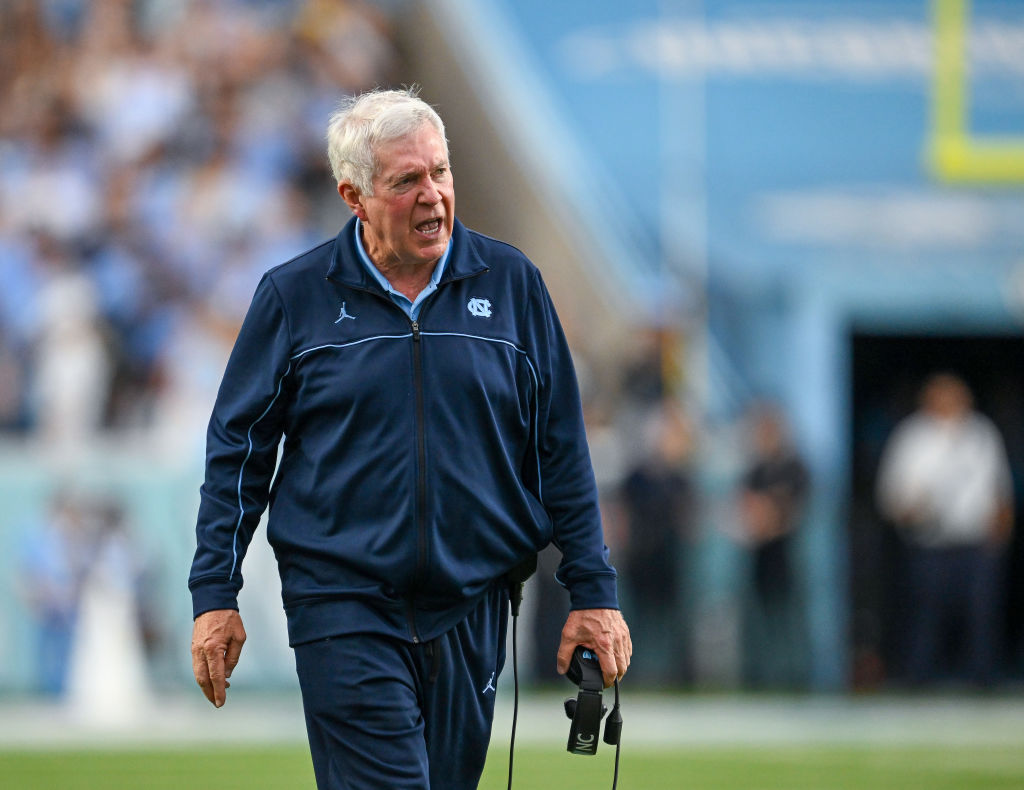Mack Brown’s Outcry Against the NCAA’s Decision
INDIANAPOLIS, Ind. – Last week, UNC head football coach Mack Brown had a lot to say to the NCAA after the governing body ruled against UNC wide receiver Tez Walker’s final appeal to play this season.
In a video message released by UNC, head football coach Mack Brown expressed extreme disappointment and frustration with the NCAA’s decision. His concerns not only highlight a widely debated issue among college athletics but also point to an underlying flaw in the current system. Brown’s sentiment echoes across the college sports community, indicating that the NCAA’s decision has touched a nerve, not just at UNC but nationwide.
Brown ended his tirade, by saying “Shame on you, NCAA. Shame on you”.
NCAA’s Justification for Denying Waivers
Today, the NCAA decided to fight back.
In a statement released earlier Tuesday that was crafted by DI Board chair Jere Morehead and vice chair Christopher Pietruszkiewicz, the NCAA explained its rationale behind ruling against Walker and other two-time transfers while calling on its membership to either get in line with the current rules or adopt new policies.

“We are a membership organization, and rather than pursue a public relations campaign that can contribute to a charged environment for our peers who volunteer on committees, we encourage members to use established and agreed upon procedures to voice concerns and propose and adopt rule or policy changes if they are dissatisfied.”
The NCAA’s defense hinges on the idea that multiple transfers adversely affect a student-athlete’s academic progress. This notion seems reasonable, at least on paper. However, critics argue that the NCAA’s stand appears one-sided and dismisses the valid reasons athletes seek transfers. The absence of concrete academic data in the NCAA’s statement to substantiate their argument only amplifies the skepticism surrounding their decision.
Many of this off-season’s waivers for two-time transfers have cited extenuating circumstances, such as mental health, as the reason for requesting immediate eligibility. Walker, who originally signed with NC Central (but didn’t play a game) then transferred to Kent State, cited his need to address his mental health and be closer to family as the main reasons for his second transfer.
Mental Health: A Point of Contention in NCAA Policies
The NCAA’s reply to student-athletes lobbying for their own mental well-being:
“Academic data demonstrates that transferring typically slows student-athletes’ progress toward a degree, especially with those who transfer later. It stands to reason that multiple transfers would further slow time to a degree. Citing extenuating factors, such as mental health, does not necessarily support a waiver request but instead may, in some situations, suggest a student-athlete should be primarily focused on addressing those critical issues during the initial transition to a third school.”
But the Morehead and Pietruszkiewicz statement does not actually cite any academic data, nor does it bother to explain or outline ‘progress towards degree’ (PTD) rules that the NCAA itself imposes.
Though, asking student-athletes to focus on their critical mental health issues is the right idea, I suppose; but once again, the onus falls to the member institution and the athlete him or herself to disclose the issues and then advocate for resources to combat these “critical issues”.
So what resources has the NCAA made available to Tez Walker and his peers in the weeks since the NCAA received his appeal? We can assume from the NCAA’s statement that help is most definitely on the way.
One of the more sensitive aspects of this debate revolves around mental health considerations. The NCAA’s position that mental health “does not necessarily support a waiver request” has sparked a backlash. Many experts and former athletes have pointed out that academic pressures and sports commitments can contribute to mental health issues. Thus, dismissing the mental health concerns of athletes seeking transfers could potentially worsen their conditions.
The lack of specific resources mentioned in the NCAA’s statement for supporting student-athletes like Tez Walker raises questions about the organization’s commitment to athlete well-being. Yes, the NCAA says that “help is on the way,” but what does that actually mean? Are we talking about financial assistance, mental health services, or academic accommodations?
Changing Times, Static Policies?
What’s perhaps most intriguing about this situation is the context in which it occurs. With a growing awareness of mental health issues and an increasing number of student-athletes willing to speak up about their experiences, it seems that NCAA policies have not kept pace. The NCAA may need to reconsider its long-standing regulations, especially those that affect the academic and personal lives of student-athletes so profoundly.
The NCAA’s decision to speak out against the backlash might be a step toward transparency, but it’s clear that significant questions remain unanswered. The organization’s reluctance to budge on its transfer policies, especially given the increasing complexities faced by student-athletes today, leaves many skeptical.
Until the NCAA can provide more concrete evidence to back its rationale and offer specific resources for student-athletes in need, it may continue to find itself at the center of debates and public scrutiny. As we move forward, it’s crucial for all parties involved—NCAA officials, university leaders, coaches, and student-athletes—to come together and establish policies that better serve the evolving needs of college sports and its participants, student atheletes.

